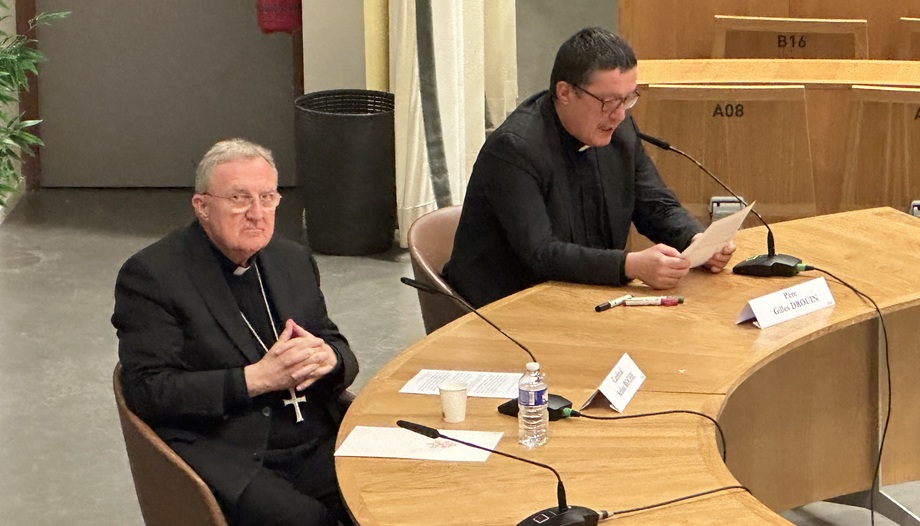A colloquium on liturgy entitled "Forming in the Liturgy and through the Liturgy" was held at the Institut Catholique de Paris (ICP) from January 31 to February 2. The main theme of the academic meeting was the Apostolic Letter of Pope Francis, "Desiderio desideravi" (DD), on the liturgical formation of the people of God (June 29, 2022). "Without liturgical formation, reforms in the rite and in the text are of little use" (DD, 34) the Pontiff points out, quoting Romano Guardini.
During the colloquium in Paris, the perspectives offered by the Holy Father in the face of the challenges facing the liturgy in these times. During the first day, the liturgical perspectives and realities of the Ivory Coast, India, Italy, Brazil and the United States were presented. The second day was devoted to exploring liturgical formation from the sources of the Liturgical Movement. The last day of the meeting was devoted to exploring the theological, spiritual and missionary dimensions of liturgical formation.
This academic meeting, organized every year by the ICP's Higher Institute of Liturgy, was attended by clergy and experts from different parts of the world - Italy, France, the United States, Ivory Coast, Brazil and Germany, among others. Also present were Archbishop Laurent Ulrich of Paris and Cardinal Arthur Roche, Prefect of the Dicastery for Divine Worship and the Discipline of the Sacraments, who was present from beginning to end.
A pastoral perspective
In his address, which concluded the work of the colloquium, Cardinal Roche gave an interpretation "from the perspective of love" of Desiderio desideravi": "I took the title of the paper from the phrase of a well-known English hymn 'Dear Lord and Father of Mankind' because it expresses very well the content of the apostolic letter of Pope Francis 'Desiderio desideravi'".
The cardinal explained that "the Pope does not intend to treat the theme in a systematic way, but wants to take the Church by the hand and lead her to the center of the mystery we celebrate. "The depth and breadth of the Holy Father's liturgical vision offers us countless opportunities to pause for personal reflection and prayer to appreciate the great gift that the Church has handed down to us in the liturgical books," the cardinal indicated.
Participate in the liturgy
Referring to the concept of "participation" in the liturgy and taking as a reference Romano Guardini's visit to the cathedral of Monreale in Sicily in 1929, Roche indicated: "To participate well, fully, actively and consciously in the liturgy is to commit oneself to a process of ongoing formation. It is liturgical spirituality. The liturgy, as Pope St. Paul VI described it, is the 'first school of spiritual life'. Through its rhythms, its words, its phrases, its prayers and its gestures, the liturgy sculpts the raw mass (us) Sunday after Sunday. This weekly assembly forms and shapes us progressively, almost imperceptibly, as God's holy and priestly people," the prefect said.
In addressing how the word "participation" has been interpreted, Roche points out that, for some, it has been taken as synonymous with "more and more activity," a constant need to "do" things during the celebration. For others, active participation is an almost purely interior engagement in the rites and prayers. Guardini, however, avoids these two extremes, exploring the true depths of participation: "He who adopts and carries the liturgical attitude, who prays, sacrifices himself and acts, is neither the soul nor the interiority, but man. It is the whole man who performs the liturgical act" (R. Guardini, "La formation liturgique", 1923).
Schools of prayer
For Cardinal Roche this affirmation of Guardini "makes it evident that when our liturgical celebrations do not respect this reality, they are not up to the task, because they do not involve the person as a whole. Some will be so spiritual that they will not be earthly or so corporeal that they will be empty of any transcendent meaning." It is necessary that our liturgies, he clarified, be true schools of prayer, because a celebration carried out with all our art and skill, will also be a formative experience: "when we allow ourselves to be formed by the liturgy, we too will be transformed and we will come closer to Christ. At that moment, the liturgy will become a living reality. The 'Lex vivendi' will no longer be a theory but a reality" and the liturgy will become Epiphany, concluded Cardinal Roche.
The ICP Higher Institute of Liturgy is an international university institution for the formation of teaching, research and pastoral leaders in the field of liturgy and the theology of the sacraments. The training is provided by a team of liturgical theologians who integrate the historical, biblical, anthropological and dogmatic dimensions of the liturgical and sacramental question.









